What a full on weekend!!
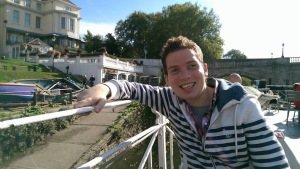
Jon, Shine’s Fundraising & Comms Officer represented Shine at YCE’s Annual Meeting together with Rachel, one of our fabulous Network Leaders!
Together with Rachel, Shine’s North East network leader, I’ve recently returned from Youth Cancer Europe’s Annual Meeting in Vilnius, Lithuania!! We were so grateful to have met everyone and to have been a part of all of the important discussions that were held.
To be honest, I was very nervous beforehand about going…with my dodgy eyesight I’m not the most confident traveller and I wondered how my anxiety and fatigue would hold out. I find meeting others who’ve been affected by cancer to be really helpful, but big events can drain my steroid induced energy (Shine Camp and the Great Escape were amazing but I regularly had to pull back as my symptoms hit home). My friends are used to me having to take timeout but at the meeting I hoped I’d be able to contribute as much as possible, represent Shine, and bring back the expertise that was shared.
YCE’s website outlines their aims:
“Together we can help shape European policy, collaborate in and promote research, fight for better access to care, for better treatments, better conditions and help fix disparities that exist across Europe for young people fighting cancer.”
And they have a great tag line too: “Giving patients and survivors a voice in Europe”.
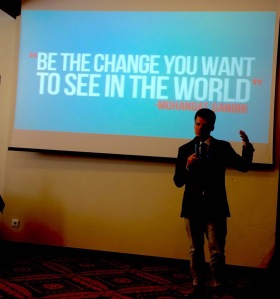
Inspiring speakers at YCE’s meeting
At first, I wasn’t sure what issues young cancer patients in Europe face, or what disparities there are between countries, but the weekend proved a crash course in information, and greatly improved my understanding of the importance of policymaking too.
After cancer in my early 20s and through my work at Shine I’ve become well aware of the need for care to be tailored more to the lifestyle of young adults. I had some idea how government and industry policy influenced care, but at the meeting I was shocked to hear some of the issues that people faced getting access to any care, let alone care tailored to their age! It was inspiring to hear from the organisations working to support younger patients in countries that are still developing systems to reflect young people’s needs.
Many people at YCE were first diagnosed as children or teenagers and many of them are still suffering the impact as young adults. The kind of issues that we explored together are issues I only started going through in my late 20s – but that I’m still struggling with 10 years later. Things like anxiety and living with uncertainty, living with the after-affects of treatment, dating when most of my friends are already well into stable partnerships, the thought of children when everyone around me already has them, and trying to get a stable career when friends have been in theirs for years! Being at the meeting really made me see how the cancer care pathway has to support people as they leave childhood/teenage years, as well as people first diagnosed early in adulthood! As the demands of life change the impact of cancer changes too.
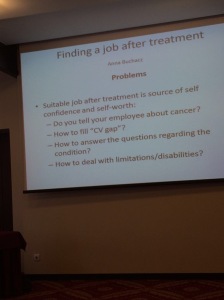
Chatting through issues about working after cancer in a breakout session
The disparities between countries in terms of access to care became very clear over the course of the weekend, as did some of the practices that were working most effectively. Being at the meeting also made me realise how fortunate we are in the UK to have the NHS. Of course, many of us, including myself, have experienced problems with how NHS services work for younger people and know that there’s room for improvement in terms of specific types of care and in coping with the after effects of cancer. But at the meeting I heard examples of countries where cancer patients have to raise funds for each scan, as well as any treatment that may follow. Processes of diagnosis and referral are often not as efficient as they could be and patients often need to research treatments themselves. While there may be times when we have to research our conditions, fight for them to be tested or argue to access to certain treatments, for the most part we do trust our NHS professionals to make decisions in our best interest.
It doesn’t matter how or when we got here as young adults who are living with cancer, all of us need support to help us live as normal lives as possible. People who haven’t felt their bodies failing them due to cancer may find this difficult to understand. Everyone faces tough things growing up, but a serious illness adds another dimension. It makes it more difficult to live that “normal” life that all your friends appear to be living.
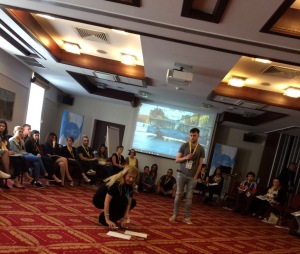
Prioritisation session for the weekend
One thing the weekend helped me to realise is that change doesn’t need to be either local or national but that together (there were 23 countries represented at the meeting), we can create bigger and more meaningful movement for all. In order for the needs of young adults to be met, we need to improve how we communicate about them to decision-makers. We also need a solid understanding of the policies in our own countries that shape access to treatment and funding for research and new therapies.
As someone who’s had a survivable cancer, I feel a sense of responsibility to increase
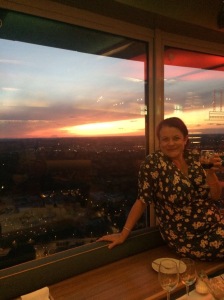
It wasn’t all work! Rachel takes in the view with a glass of wine!
awareness of what I have experienced so that others going through it in the future can have care that reflects their stage in life. Working together with YCE will allow Shine and the other participants to better examine and share practices, support others, and build a voice so that we can have a say about decisions made for us. Cancer patients have power and, if we are knowledgeable enough about how health systems work, we can speak on behalf of the 210,000 young adults currently living with and beyond cancer in the UK, to influence those decisions.
Jonathan is Shine’s Fundraising and Communications Officer. Why not sign up to this blog (see the button at the top!) or follow us on Instagram @shinecancersupport?
